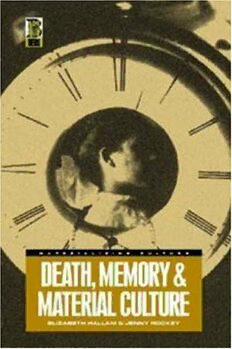
Death, Memory and Material Culture (Materializing Culture) PDF
265 Pages·2001·0.601 MB·English
Most books are stored in the elastic cloud where traffic is expensive. For this reason, we have a limit on daily download.
Preview Death, Memory and Material Culture (Materializing Culture)
Description:
· How do the living maintain ongoing relationships with the dead in Western societies?· How have the residual belongings of the dead been used to evoke memories?· Why has the body and its material environment remained so important in memory-making?Objects, images, practices, and places remind us of the deaths of others and of our own mortality. At the time of death, embodied persons disappear from view, their relationships with others come under threat and their influence may cease. Emotionally, socially, politically, much is at stake at the time of death. In this context, memories and memory-making can be highly charged, and often provide the dead with a social presence amongst the living. Memories of the dead are a bulwark against the terror of forgetting, as well as an inescapable outcome of a life’s ending.Objects in attics, gardens, museums, streets and cemeteries can tell us much about the processes of remembering. This unusual and absorbing book develops perspectives in anthropology and cultural history to reveal the importance of material objects in experiences of grief, mourning and memorializing. Far from being ‘invisible’, the authors show how past generations, dead friends and lovers remain manifest – through well-worn garments, letters, photographs, flowers, residual drops of perfume, funerary sculpture. Tracing the rituals, gestures and materials that have been used to shape and preserve memories of personal loss, Hallam and Hockey show how material culture provides the deceased with a powerful presence within the here and now.
See more
The list of books you might like
Most books are stored in the elastic cloud where traffic is expensive. For this reason, we have a limit on daily download.
